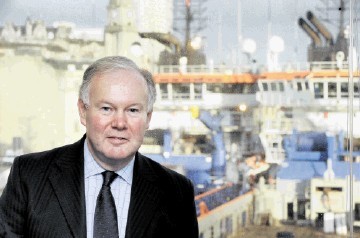
Energy Minister Charles Hendry said on a visit to Aberdeen that the UK North Sea had seen a record volume of project approvals and spending this year.
Despite this, not enough opportunity was being given to the domestic supply chain, he said, adding that the Department for Energy and Climate Change (DECC) was encouraging operators to use more British expertise.
He also shrugged off concerns over a 40% slump in exploration and appraisal well drilling in the UK North Sea this year.
Mr Hendry said 30 projects – a record number – worth £14billion had been approved this year, however, he added this should be viewed in the context of there being more smaller developments and that costs were now more expensive.
The minister said DECC was now taking a “not-neutral” stance on UK content in developments.
“I feel very strongly about this,” he said, adding: “I want British companies to have opportunities to go for work on new contracts.”
He said in some cases he had personally called the chairmen of companies to encourage them to use UK supply-chain firms and that this, and a realisation the government was taking an interest in supply-chain work, had made a difference.
Two contracts due to be announced imminently would be carried out by UK yards, he said.
However, he admitted there was nothing DECC could do to stop companies going elsewhere if they so wished.
Nexen announced recently that two major platform contracts had been awarded to Lamprell in the United Arab Emirates.
According to industry body Oil and Gas UK (OGUK), exploration drilling has been carried out on 13 wells this year.
This compares with 28 last year, with many people blaming the government’s March tax grab for the drop.
Mr Hendry, who was at an Apache dinner in Aberdeen on Tuesday night, said: “One can’t read too much into one year’s figures.
“That the entire board of Apache has come over here indicates their confidence in the future of the North Sea.”
Alex Kemp, professor of petroleum economics at Aberdeen University, said there were a number of factors – such as increased scrutiny in the wake of last year’s oilspill disaster in the Gulf of Mexico – influencing the drop.
He also pointed to the expiry of first and second-round exploration licences and the fact an initiative to revive fallow acreage had now run its course.
Professor Kemp said the tax grab was more likely to have an impact in 2012.
OGUK economics director Mike Tholen said the drilling decline was certainly of concern. He added: “While these figures may represent the first signs of downward trend, it is too early to be certain whether we are seeing a long term trend.”
Mr Hendry said the industry should help to fund two emergency tugs stationed in Scotland and which had their government funding scrapped this year.
He added that the issue was being looked at by the Department of Transport and there was work going on to find longer-term funding, but the service was commercial so it was only right to “see what role industry should have”.
Recommended for you
